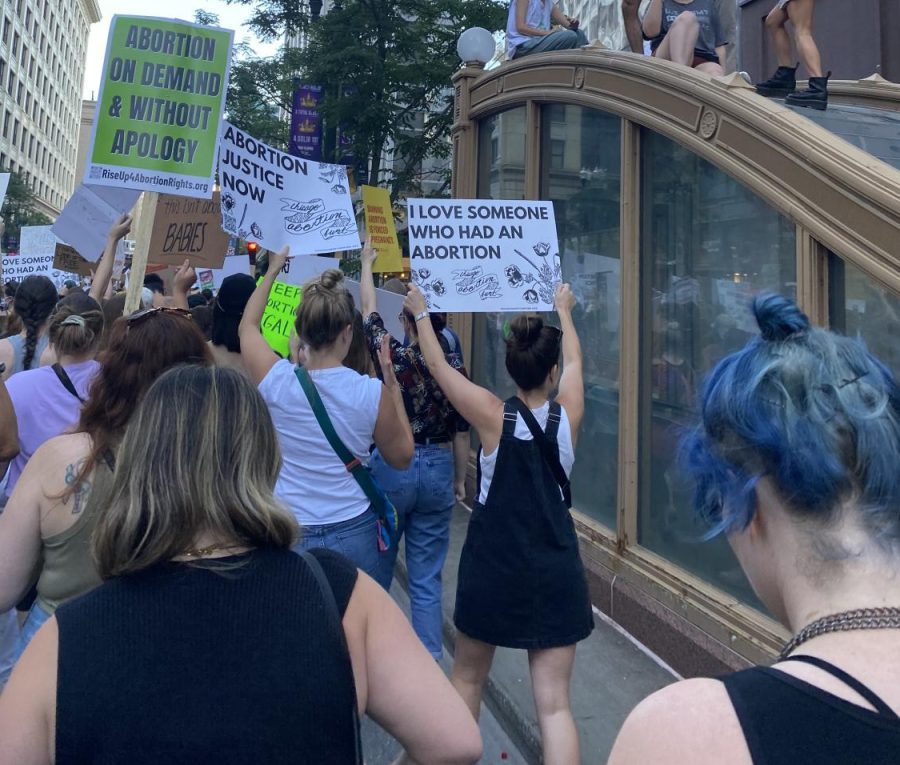A view of the Roe reversal from Chicago
Pro-abortion protestors march in a Chicago rally on June 24. Life-long abortion activists and politicians speak on the Roe v. Wade reversal.
June 30, 2022
In the now ubiquitous Roe v. Wade reversal that the supreme court released in full this month, the court wrote that the “right to obtain an abortion was not deeply rooted in the nation’s history.” Depending on the interpretation of such a claim, the history of three generations of Tamar Westphal’s family might say otherwise.
At a pro-abortion rally at Chicago’s federal plaza the day that Roe was overturned, Westphal held this history aloft, bearing a protest sign that described the different contributions that familial generations had made to the struggle for abortion and contraception rights in the U.S..
The sign described a great-grandmother who in the 1930s imported contraception: A grandmother who “devoted her life to gender and racial justice” and a mother who trafficked abortion seekers to Canada before Roe was legalized in the 70s.
The current generation’s contribution: “not going back.”
Such sentiment was shared among the hundreds who came out to protest in Chicago on June 24 and 25.
Get The Daily Illini in your inbox!
One marcher held a sign with a hanger on it that was framed by spattered, fake blood. Another sign was simple and to the point: “Girls will die.”
The 100s-strong procession on June 24 made its way down Dearborn avenue, headed at the front by figures like Illinois Gov. J.B. Pritzker.
As a chant, female voices shouted “My body, My choice!” to which more male voices supportively responded “their body, their choice!.”
An onlooker walking along the sidewalk with a companion looked at the hulking crowd — a mosaic of ages, genders and signs — and sobbed.
The next day, Debby Pope, a retired Chicago teacher and a Teacher’s Union member, spoke about the sense of backsliding that the Roe reversal created.
“I think we have to take them head-on because if we don’t we will lose the freedoms,” Pope said, referring to the right to an abortion.
“When I was younger, I was out on the streets fighting for Roe v. Wade,” Pope said at a noon rally also at Federal Plaza the next day. “My life would have been totally different if I was forced to have a child when I was no way ready to have a child.”
Though this rally was a smaller affair, a still significant amount of demonstrators like Pope came to protest a day after the reversal, despite an impending storm that would eventually cut through the time allotted for speakers.
Among them was Illinois Lieutenant Governor Juliana Stratton, who asked demonstrators to support abortion providers and demanded that politicians support women seeking abortions in states where it is now criminalized.
Three doctors in medical smocks who preferred to be unnamed due to the nature of their careers showed up to the midday rally and echoed the previous sentiment.
“We believe that women’s health is a human right, and is part of health care, and our careers and our training are affected by these bans. We believe that women are going to suffer,” one of them said.
Lt. Gov. Stratton assured citizens that the right to an abortion was still sacred in Illinois.
“If you’re paying attention, and I know you will have been paying attention,” Stratton said, “Justice Clarence Thomas made himself very clear that today it is abortion, but tomorrow it is the right to birth control, the right for same-sex couples to marry whomever they choose, and the rights of trans and nonbinary peoples to live safe, happy, and healthy lives.”
Pritzker and Stratton will be on the ballot the following Tuesday for the state primary, which the Lt. Gov. referred to in an attempt to encourage attendees to vote and support the governor and pro-abortion candidates up and down the ticket. All Republican candidates in the Illinois gubernatorial race are pro-life, something Stratton warned of early in her speech.
The words of the next speaker stood in stark contrast to Springfield politician Stratton.
Andy Thayer, an LGBTQ+ activist and co-founder of the Gay Liberation Network and Chicago Coalition Against War and Racism, rebuffed “talk” at the previous rally that “emphasized voting as the best way to free us.”
Thayer pointed to the fact that the six justices who supported the Roe reversal were unelected, along with harkening back to the now-infamous Clarence Thomas confirmation hearing that was, as he emphasized, presided over by now-President Joe Biden.
Thayer, to the mixed reactions of attendees, said in a pejorative sense that it is “no mystery what he (Biden) is about in regards to not only LGBT lives, but Black lives and woman’s lives.”
“That wasn’t the first time Democrats put their fingers to the wind and betrayed us,” Thayer said in front of the Democratic party-supported lieutenant governor, “and it won’t be the last.”
Thayer called for “resistance” in many forms, such as breaking “unjust laws,” before calling for support for a “stealth action” to interrupt a “ghastly corporate pride parade,” and to counter-protest against anti-abortion demonstrators in early July.
“Can we give them the Chicago welcome?” Thayer asked the crowd.







